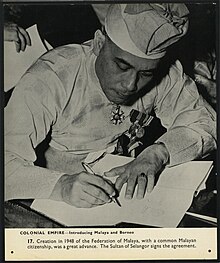Hisamuddin Alam Shah
Sultan Hisamuddin Alam Shah ibni Almarhum Sultan Alaiddin Sulaiman Shah KCMG (born May 13, 1898 in Selangor , † September 1, 1960 in Kuala Lumpur ) was a Malaysian nobleman who was Sultan of the State of Selangor from 1938 to 1942 and from 1945 to 1960 was and was from April 14 until his death on September 1, 1960 as the second electoral king of Malaysia ( Yang di-Pertuan Agong ) in office. With a reign of only 139 days, he had the shortest term of any fourteen electoral kings to date.
Life
Origin, succession to the throne and first sultanate
Hisamuddin Alam Shah was the eldest son of Alaeddin Sulaiman Shah , who was Sultan of Selangor from 1898 to 1938, and a commoner. During his visit to Malay College Kuala Kangsar in 1929 he was instrumental in founding the Malay College Old Boys Association (MCOBA). In 1931 he was honored with the title Tengku Laksamana . Shortly thereafter, there was a dispute over the succession to the throne, as Sultan Alaeddin Sulaiman Shah had two older sons with a princess of Kedah : Tengku Musa Eddin and Tengku Badar Shah . Musa Eddin was honored with the title Tengku Mahkota in 1903 and in 1920 as Raja Muda Crown Prince and thus heir to the throne.
However, through the influence of Theodor Samuel Adams , the British resident in Selangor, Crown Prince Musa Eddin was deposed as Raja Muda for alleged misconduct . Adams accused the Crown Prince of being lavish, boastful, and addicted to gambling, while numerous Selangor residents believed that the real reason the Crown Prince was deposed was because of the resident's failure to follow instructions. Although Sultan Alaeddin Sulaiman Shah campaigned in favor of the Crown Prince and even had direct talks with the British Colonial Minister in London , Hisamuddin Alam Shah became the third son - and thus bypassing the second son, Prince Badar Shah - on July 20, 1936 to become a Raja Muda and heir to the throne appointed.
Four days after his father's death, Hisamuddin Alam Shah was proclaimed the fifth sultan of Selangor on April 4, 1938, and was crowned king on January 26, 1939 in a ceremony presided over by his eldest brother, Musa Eddin, in the royal capital of Klang . After his coronation, he was made Knight Commander of the Order of St Michael and St George in 1938.
After Selangor was occupied by the Imperial Japanese Army , on January 15, 1942, he held talks with Major General Minaki and Colonel Fujiyama, the military governor of Selangor, in Kuala Lumpur and admitted that he had spoken out in favor of Great Britain through the influence of the British resident. Thereupon he had to hand over the rule as Sultan of Selangor to his eldest brother Musa Eddin, who was proclaimed as Musa Ghiatuddin Riayat Shah as the sixth Sultan of Selangor in November. Hisamuddin Alam Shah refused to cooperate with the Japanese occupying power and, from 1943 onwards, also renounced the apanage offered to him and his children by the Japanese .
Second sultanate and second electoral king of Malaysia
The return of British troops to Malaysia in 1945 meant that he became sultan a second time, while the previous Sultan Musa went into exile on the Cocos Islands . On March 1, 1946, he was chairman of the first Malay Unity Congress in Kuala Lumpur, which was decisive for the establishment of the United Malays National Organization (UMNO), the largest and at the same time most important ruling party in the country. The organization of the congress was in the hands of the writer and president of the Selangor Malay Society (PMS), Zainal Abidin Ahmad , a critic of British rule. In 1952 he was the first Malaysian prince to undertake a Hajj to Mecca .
In preparation for the independence of the Malaya Federation from Great Britain on August 31, 1957, he was elected Viceroy on August 3, 1957 and thus the representative of the first Yang di-Pertuan Agong Abdul Rahman .
After his death before the end of the five-year electoral reign on April 1, 1960, Hisamuddin Alam Shah succeeded him as the second electoral king and began his reign as Yang di-Pertuan Agong on April 14, 1960. However, on September 1, 1960, the day of his official coronation, he died in Kuala Lumpur and was subsequently on September 3, 1960 in the Royal Mausoleum near the Sultan Sulaiman Mosque in Klang.
Successor as the third electoral king Malaysia was thereupon on September 21, 1960 the Sultan of Perlis , Syed Putra , who was the first king to end a regular five-year term. He was succeeded as the eighth Sultan of Selangor by his son Salahuddin Abdul Aziz , who was Malaysia's eleventh electoral king between 1999 and 2001 and who died in office like his father. With a term of office of 2 years and 62 days, he was the electoral king with the second-shortest reign after his father.
Web links
- Sultan Sir Hisamuddin Alam Shah in the Munzinger archive ( beginning of article freely accessible)
- Malaysia (rulers.org)
- Malaysian States (rulers.org)
| predecessor | Office | successor |
|---|---|---|
| Abdul Rahman |
Yang di-Pertuan Agong 1960 |
Syed Putra |
| personal data | |
|---|---|
| SURNAME | Hisamuddin Alam Shah |
| ALTERNATIVE NAMES | Hisamuddin Alam Shah ibni Almarhum Sultan Alaiddin Sulaiman Shah (full name) |
| BRIEF DESCRIPTION | Malaysian King, Sultan of Selangor |
| DATE OF BIRTH | May 13, 1898 |
| PLACE OF BIRTH | Selangor |
| DATE OF DEATH | September 1, 1960 |
| Place of death | Kuala Lumpur |
